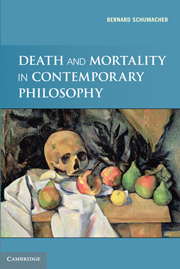Introduction
Published online by Cambridge University Press: 05 June 2012
Summary
Although it is widely discussed within the framework of bio- and medical ethics, sociology, history, and literature, at the dawn of the third millennium death is the subject of a taboo that has been epitomized by the expression “the pornography of death”. Public practices and discourse pertaining to death are no longer connected to the “private” experiences and feelings of those who die or are in mourning. After holding a prominent place for thousands of years at the very heart of human culture, death has vanished from everyday communications, and contemporary Western society even tends to suppress anything that calls it to mind. It has become rare to see someone die. People no longer die at home, but rather at the hospital; the dead are, in a way, excluded from the community of the living. As for burial, it has been disguised so as not to recall too explicitly the victory of death that awaits everyone, as though the important thing were to camouflage or mask that victory. Meditation on death is avoided like the plague, because we prefer to occupy ourselves with things that are less lugubrious and, one might add, less obscene. Death causes those who speak about it to shiver and to experience an uneasiness mingled with a fear of their own death or of the death of a loved one; it is mentioned only in cloaked terms; Montaigne noted that people “take fright at the mere mention of death, and […] cross themselves […] as at the name of the devil”. Pascal emphasizes that “as men are not able to fight against death, misery, ignorance, they have taken it into their heads in order to be happy not to think of them at all”. Freud notes that “we [contemporary men and women] [have] showed an unmistakable tendency to put death to one side, to eliminate it from life. We have tried to hush it up”.
Thus the human being is deprived of his death. We constantly lie to ourselves, saying that it is always someone else who dies, but never myself. The individual is content to live day by day in what Heidegger calls inauthenticity [Uneigentlichkeit], in a recognition that “one dies” that is never taken personally but is invariably perceived as someone else’s business. This notion that “one dies” dominates everyday life and expresses “an indefinite something which, above all, must duly arrive from somewhere or other, but which is proximally not yet present- at-hand for oneself, and is therefore no threat”. Such an attitude does not acknowledge death but tries to neutralize it by denying it. The death of a loved one, in particular, is seen – through a reaction of fear – as a mere happenstance, an accident, and is no longer viewed from the positive perspective as an existential shock that enables the survivor to transcend his everyday attitude of activity for activity’s sake and to open himself to reflecting upon the meaning of his existence, personally and communally. Contemporary philosophy on the subject of death, or “thanatology”, aims to awaken the human being from the drowsiness resulting from this negation or this rejection of death; it tries to bring the human being to face his own mortality. It also seeks to tame death somewhat by confronting it directly, by seeking to understand the typically human attitude toward it, and by questioning the rationality of the fears that it arouses.
- Type
- Chapter
- Information
- Death and Mortality in Contemporary Philosophy , pp. 1 - 10Publisher: Cambridge University PressPrint publication year: 2010



